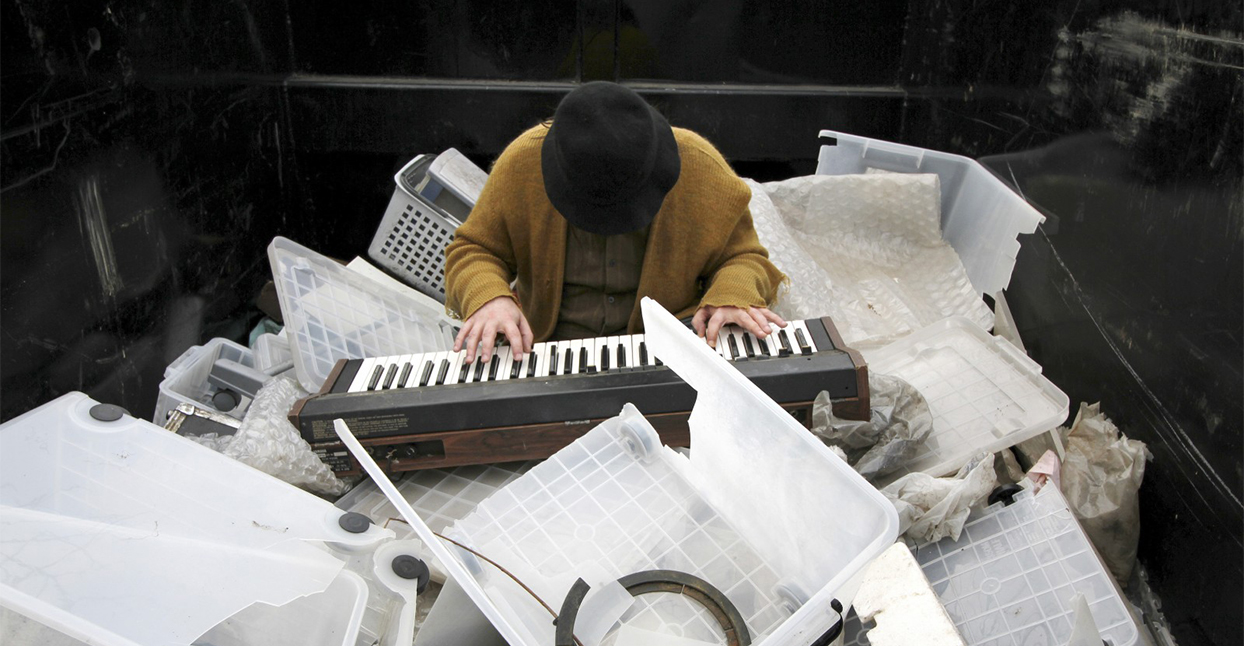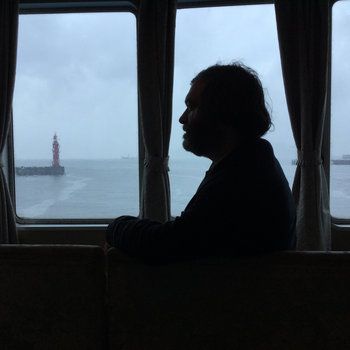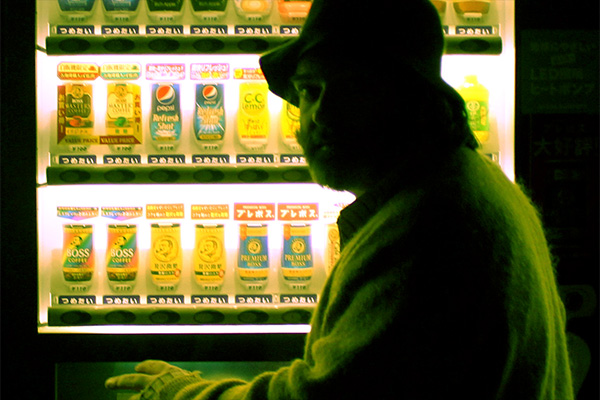
Photo by Taikou Kuniyoshi
In 2013, Jim O’Rourke posted his first Bandcamp release, a tour CD from earlier that year which he listed as Steamroom 1, naming the album after his home studio. In the three years since, he has posted 29 editions of Steamroom. The series, available only on Bandcamp, features a mix of previously-released albums, unearthed archival material, and brand new music.
Taken as a whole, the Steamroom series is like a wordless diary of O’Rourke’s creative life in Tokyo, where he’s lived for nearly a decade. He spends most every day in his studio, recording sounds on his Serge synthesizer and mixing them with field recordings to create rich, detailed pieces that usually last over 30 minutes, and sometimes as long as an hour. O’Rourke still makes rock music, too—his 2015 Drag City album Simple Songs was a sharply-crafted tour de force—but for fans of his more experimental leanings, his Steamroom releases feel like missives meant just for them.
Speaking to us from his Tokyo home, O’Rourke explained why he turned to Bandcamp to distribute this music, and how that has influenced his process. He’s humorously self-deprecating, often downplaying the popularity and impact of his music, but he’s also clearly devoted to the unique mode of craft he’s carved out over the past few years.


Why did you decide to post some of your older albums on Bandcamp?
Well, it’s not like it’s hard to find used copies, but there are people who don’t look for used records; they just see what they can get on the internet. Also, I now have the ability to get these records to sound the way I meant in the first place. [For example] with Scend, that got pressed in 1990 or so. Back then, you would send the plant a DAT tape and say, “[use] from here to here,” and quite often they would mess up. The whole run of the original CD of Scend had silence at the end, which was intended, but after that there’s four minutes of music that I don’t know where the hell it came from [laughs]. So sometimes it’s a case of fixing things like that.
Has it been interesting to listen to this old music again?
It depresses me [laughs]. It makes me wonder what I’m doing with my life. I don’t think I get an ounce of enjoyment from doing this whatsoever…anybody who tells you they do is insane. But I’m trying to counteract my tendency to hide all that stuff. So occasionally I’ll find a tape after years of forgetting it even existed, and if I’m surprised by it—like, ‘Oh, that isn’t complete crap’—then I’ll post it. It’s a puzzle piece that I’ve hidden until now, I guess. Only about 50 people care, but when I think of people whose music I really love, I remember that I’m always happy when they do that.
Do you get feedback on what you post? Do people request specific older releases?
Not that I know of. Some of the messages are so weird. There was one woman who wrote to me saying I needed to save their marriage. She wanted me to come to where they lived and spend time with her husband. But occasionally people say, ‘Thanks for putting this stuff out. Keep doing it.’ And that’s very encouraging.
What do you like about using Bandcamp for your new music?
More and more, there’s no point to putting out [physical] records of this stuff. Because I’m making stuff every single day. With the way things are now, it becomes almost like a media cycle, where everything’s ‘the new album by Blah Blah Blah.’ And I didn’t want these things seen as ‘the new Blah Blah Blah,’ I just want it seen as ‘it’s what I do.’ So one of the things I like about the way Bandcamp is set up is, it just becomes this level field. Things exist on it, and if you’re interested it’s there; if you’re not, you can go back to TMZ or whatever.
And you don’t have to worry about doing a ton of promotion.
No. I don’t want anything to do with that world at all. I don’t want it to be about me. There’s this work that I did; if you’re interested, it’s there. That’s the level I want it at. I just want to put the stuff up, and it’ll exist there for as long as I’m alive, and then it’ll disappear, and that’s it. It’s just about the work, and this is the easiest way to get it out there. Actually, the easiest way would be if somehow I could send the music to people directly. But I don’t necessarily know who they are. This is the closest way to do it.

Do you make new music pretty quickly, or do you revise a lot?
Most of it takes quite a long time. I think there are one or two releases that came together quickly, and just worked. But I like longform music that isn’t necessarily about structure. It’s just about a long period of something happening. I’m doing that kind of thing all the time. Until Bandcamp, there’s been no way that I felt comfortable letting other people hear them.
What do you like creatively about longform music?
It’s just my pace. It’s not a question of patience. It’s just my taste. I like longer music. It all really comes down to breathing. Even when I do records with songs, the rhythms on those are very specifically related to breathing. Henry Kaiser said this amazing thing when I first met him. A guy came up to him and mentioned a Captain Beefheart song and asked, ‘What time signature is that?’ And Henry said, ‘They’re all in one.’ That blew my mind. I was 19 or 20 at the time, but that really changed my life, him saying that.
I was just working on my new one today, and I’ve been going over the same section every day for about a week now. Sometimes I’m shaving off a second here or there, or fading something out. It doesn’t change; I’m just seeing it better every time. It’s not like, ‘Oh, today I feel it should be faster. Yesterday felt it should have been slower.’ It’s just seeing it better each time, and that ‘one’ stays the same. And the ‘one’ would be different for someone else.
How do you decide a piece is finished?
Often I won’t touch it for a week or maybe even a month, to make sure the next time I hear it from some sort of different standpoint. And I always have a handful of things going on at the same time, because it helps you see things from a different perspective as you move back and forth. It’s like how in the middle of a mix, you walk out of the room and all of a sudden you realize, ‘Oh, the bass drum needs to be gone there.’ You had to get up and move to be able to hear it that way. So I purposely will work hard on something and then pull myself away from it, to make sure I don’t just finish it because I want to finish it. I always just want to finish the things and get them out of my life [laughs]. Once I finish making something it’s fucking dead to me. It’s over. I’m already on to something else.
Where is your studio now?
It was in my house until the earthquake, and then I had to move it out because the house isn’t stable enough for it anymore. So I got this tiny room in an office building right by my house. I can’t record, really—I can’t turn on the guitar amp or anything. But the stuff I’m working on there mostly doesn’t involve that. I’ve got the Serge [synthesizer] and the things that I use for it, but I can’t record acoustic music there.
Do you do any field recording?
Sure, yeah. I’m not as adamant as I should be, but I usually have some sort of portable recorder with me. And I try to take a day every few weeks to go gather stuff, or I keep a note when I find a place that’s worth recording, and go back there.
So you keep a trove of field recordings and Serge material?
It’s mostly stuff done on the Serge. I usually record five to six hours of stuff on the Serge a day, and that all goes onto hard drives and gets labeled. Oren Ambarchi was here a few weeks ago, and we were finishing up our new record, and he said, ‘Oh, we need a sound,’ and I pulled out this hard drive out of a box that had about 50 hard drives in it. And he said, ‘Oh my god. How much of this stuff do you have?’ It’s a lot. It’s really like having a library.

So you’re a librarian as well as a musician.
Not a very good one. I’m not as organized as I should be. It’s actually for the best, because if I became organized the stuff would become crap. You’ve got to keep an element of chaos in there or you’re screwed.
How did you choose the name Steamroom for your home studio?
[In the early ’90s] I found a little door label, like one of those badges that you put on doors, and it just said ‘Steamroom.’ I still have it, and it goes up wherever I am. At first it was on a small room in my parents’ basement, where I made the Faust record [Rien, 1994] and lots of other stuff.
That sign has survived all the way until now?
Now that you mention it, I haven’t seen it in a while. But nonetheless, my studio still is Steamroom.
How do you make the artwork for your Bandcamp releases?
Most of them are taken from the veranda where I work. Except for one or two, they’re all just pictures I took. Usually there’s some sort of visual pun going on with it. And I think one or two are actually pictures of the show featured in the recordings.
Does using Bandcamp influence your working process?
It does have a lot to do with it. The new things I would be making anyway, but they would have just disappeared forever. I just have to make them. It’s like my oxygen. If I could somehow make a living just doing those things, that’s what I would do. But that’s obviously not possible. So it has helped. And Bandcamp was the first internet thing that I saw that I thought had a bit of honor to it. Because everything up to then, iTunes and all that stuff, is absolutely criminal. People say, ‘How would you know? You don’t put your stuff on iTunes.’ And I don’t. But music that I helped make with other people, like Sonic Youth or Wilco, is on iTunes. So I actually see what you get from them, and it’s so incredibly criminal it’s insane—if people only knew.
Plus, when Bandcamp started it was the first place I saw where you could choose what audio quality you sell. And that was really, really important to me. Because I don’t want people listening to MP3s or whatever the other lossy formats are. I think a person who makes something has a right to tell people how to see it or look at it or hear it, at least as a suggestion. And there was no choice to do that until Bandcamp came along.
So you work on new music every day?
Yes. The Bandcamp stuff, that’s where I put in most of my energy every day, just making those things. I’ve spent so much of my life working on other people’s music, and I haven’t even done one percent of what I want to do myself, so I decided I’m going to just barrel down and do it—if I go broke, then so be it. Tokyo’s not as expensive as people think it is. It probably costs a third as much to live here as New York. I just live within my means. Occasionally I get work here and there, but I’m not looking for it. I’d rather just do what I want to do.
It must be somewhat liberating.
Yeah. I wish the days were longer. I wish I had more time to work on things, and to study. But obviously, I can’t complain. I have a roof, and I can eat. And there’s nothing else you need, really.
—Marc Masters







